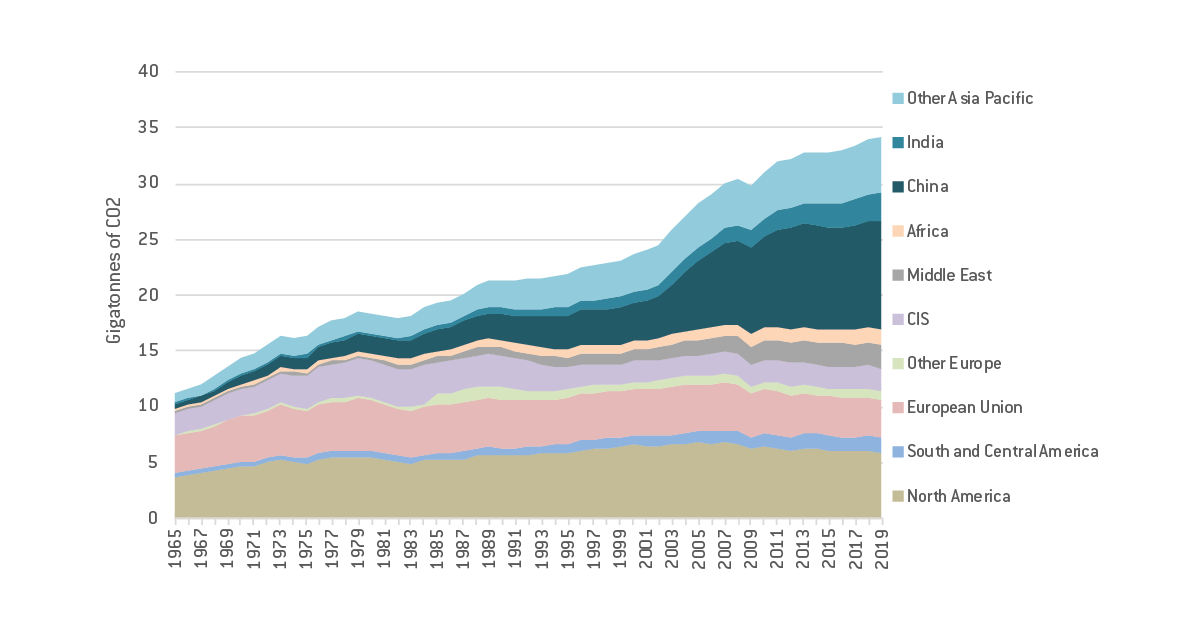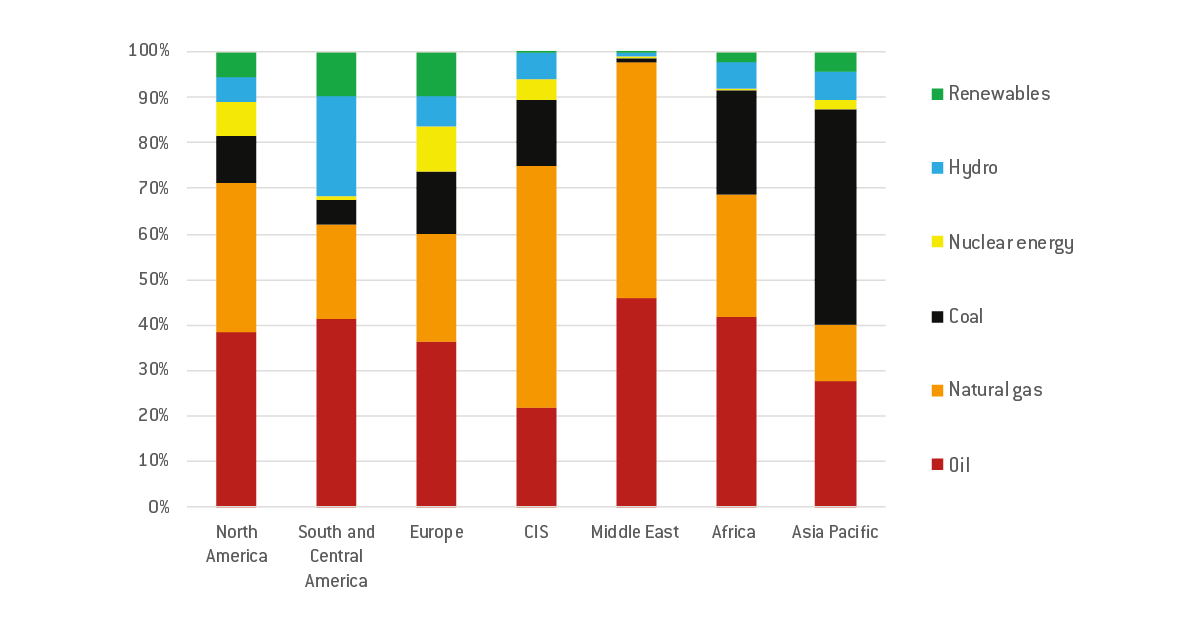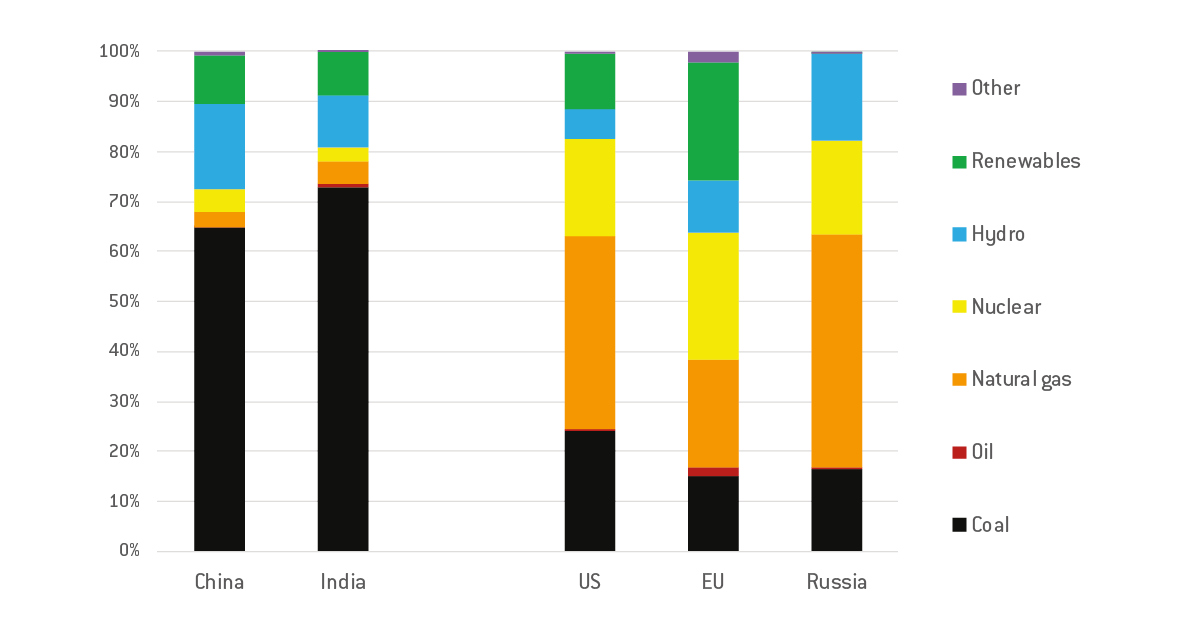Blog Post
For the climate, Asia-Pacific must phase out fossil-fuel subsidies
An exit from coal in the Asia-Pacific region is a global decarbonisation priority.
The extent to which the Asia-Pacific decarbonises will make or break the global fight against climate change. As home to 60% of the world’s population, and as the main engine of global economic growth, the Asia-Pacific has been since the early 2000s the main carbon dioxide emitting region, producing about half of the world’s total emissions.
Figure 1: Global emissions by region, 1965-2019

Source: Bruegel based on BP Statistical Review of World Energy (2021). Note: data refers to carbon dioxide emissions resulting from fossil-fuel combustion, as listed in the IPCC Guidelines for National Greenhouse Gas Inventories. Other sources of CO2 emissions, or other greenhouse gases, are not included.
Compared to other world regions, the Asia-Pacific faces a specific decarbonisation challenge: a need to decrease rapidly its reliance on coal, which makes up about 50% of Asia-Pacific’s energy mix. In other regions, coal makes up from 10% to 20%.
Figure 2: Energy mixes of different world regions, 2019

Source: Bruegel based on BP Statistical Review of World Energy (2021).
The coal challenge is particularly pronounced in China and India, which respectively account for 60% and 14% of Asia-Pacific emissions. About 70% of electricity generation comes from coal in both countries, compared to about 20% in other major emitters including the United States, the European Union and Russia (Figure 3).
Figure 3: Electricity generation mixes, China, India and other selected countries, 2019

Source: Bruegel based on BP Statistical Review of World Energy (2021).
All in all, coal in China and India is currently the single biggest contributor to global greenhouse-gas emissions. Phasing down the use of coal in these two countries is thus absolutely critical if the world is to meet the Paris Agreement objectives and fight climate change.
As a second order, but still important, objective, the coal dependency of Asia-Pacific low-income countries needs to be reduced because the share of coal in electricity generation in these countries is increasing rapidly with the expansion of electricity demand and infrastructure, with which natural gas and hydropower cannot keep up.
Asia-Pacific countries have increasingly adopted policy measures designed to fulfil their climate pledges under the Paris Agreement. These policies range from air-quality regulations to renewable-energy subsidies, from vehicle emission standards to carbon-pricing mechanisms.
While welcome, these measures will certainly not be enough without tackling the most pressing and significant problem of excessive reliance on coal in the energy basket. In fact, notwithstanding the adoption of climate policy measures, countries in the region continue to subsidise significantly the consumption of fossil fuels, including coal. China continues to subsidise coal for at least four reasons: i) to provide cheap electricity and heating to citizens, as coal plants remain a low-cost electricity supply option compared to natural gas and offshore wind (and might remain so until 2026); ii) to foster industrial competitiveness by using cheaper electricity for production; iii) to enhance energy security by reducing the need for energy imports; and iv) to support the coal industry, which employs about six million workers, mainly in north-eastern provinces, which been suffered most growth-wise since 2015.
The International Energy Agency (IEA) estimates that, in 2019, Chinese fossil-fuel subsidies amounted to $30 billion, while in India they were $21.8 billion and in Indonesia $19 billion (Table 1).
There is really no justification for subsidising fossil fuels in a context in which their share in the energy mix must be reduced drastically. In fact, for Asia to meet its carbon neutrality goals, no new coal mines should be constructed because there will be a sharp decline in fossil-fuel demand. According to the IEA’s May 2021 Net-zero by 2050 roadmap, global coal demand should decline by 90%, to just 1% of total energy use, by 2050.
Not only are fossil-fuel subsidies counterproductive, they also divert resources from other potentially necessary subsidies for renewable energy. While data is not fully comparable, let alone transparent, estimates of China’s subsidies for renewables in 2019 hovered between $1.1 billion (27 times less than fossil fuels) and $13 billion (a little bit less than three times less). India only devoted $1.5 billion to renewables (more than 15 times less than fossil fuels), and Indonesia $1.1 billion (17 times less).
Table 1: Fossil fuel subsidies in selected Asia-Pacific countries, 2019 ($ billions)
These subsidies represent a major stumbling block in path towards decarbonisation in Asia-Pacific. Consequently, the first climate policy must be to ensure that fossil fuels do not get direct or indirect government support.
Only by phasing-out these subsidies can market distortions be avoided and the potential deployment of renewable energy and energy efficiency solutions fully unleashed. Furthermore, the phase-out of these subsidies is important to free-up public finance resources that can be reallocated towards green investments and towards compensatory measures for the poor – to ensure climate justice.
In this context, the very rapid increase in the number of coal power plants in developing Asia in the last few years is very concerning. This shows that international coordination is needed to stop the financing of coal. The May 2021 announcement by the Asian Development Bank that it will stop financing coal is welcome, but others must follow. In particular, given the huge role of Chinese public banks in the financing of coal plants in the region, an international coordinated effort to stop such financing is needed to expedite the shift away from coal in these countries’ energy baskets.
Finally, it should be mentioned that while discussions on carbon pricing are important in Asia, as they are for the rest of the world, the sheer amount of fossil-fuel subsidies makes this issue rather secondary compared to the need to reduce the immediate distortions generated by fossil-fuel subsidies.
Take China. After years of pilot schemes at regional and sub-regional levels, China announced in 2017 the creation of national emissions trading system (ETS). The scheme’s first compliance period, initially due for 2020, will now start in mid-2021, covering coal- and gas-fired power plants (approximately 40% percent of national carbon emissions). While it is still too early to say how the ETS will develop, TransitionZero has estimated – using satellite images and machine learning to estimate operations at China’s biggest coal plants in 2019 and 2020 – that China is likely to have oversupplied the scheme by as much as 1.6 billion allowances for 2019 and 2020, potentially causing prices to quickly crash to zero when trading begins later this year. Should this happen, it might thus take several years before China’s ETS becomes an effective decarbonisation tool. Considering the $12 billion in fossil-fuel subsidies provided to the electricity sector every year, China’s carbon price would thus be negative. This represents a major concern for global decarbonisation efforts. In its Net-zero by 2050 roadmap, the IEA notes that China’s carbon price should reach $45 per tonne by 2025 to be consistent with a net-zero scenario by mid-century.
All in all, the phase-out of fossil-fuel subsidies must be the first step in decarbonisation of the Asia-Pacific region. It really is a key prerequisite for the development of properly functioning carbon-pricing systems and the unleashing of their vast potential for driving decarbonisation in this region. Coal subsidies are not only an issue in Asia, of course. There is probably no more important issue on the climate change front, though much more attention is given to carbon pricing or carbon tariffs. For industrialised countries, helping create the incentives to dismantle coal subsidies in China and India, and stopping the building of more coal plants, especially in the rest of Asia, should be a priority in their international climate strategies.
Recommended citation:
García-Herrero, A. and S. Tagliapietra (2021) ‘For the climate, Asia-Pacific must phase out fossil-fuel subsidies’, Bruegel Blog, 31 May
Republishing and referencing
Bruegel considers itself a public good and takes no institutional standpoint. Anyone is free to republish and/or quote this post without prior consent. Please provide a full reference, clearly stating Bruegel and the relevant author as the source, and include a prominent hyperlink to the original post.









